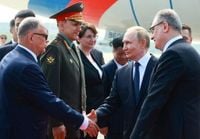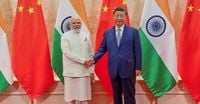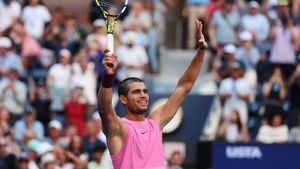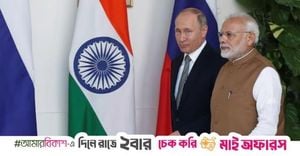In the bustling port city of Tianjin, northern China, the world’s attention turned to the Shanghai Cooperation Organisation (SCO) summit as leaders from across Asia and beyond gathered for what has been called the largest-ever meeting of the influential bloc. The summit, which ran from August 31 to September 1, 2025, marked a pivotal moment in regional and global diplomacy, with Chinese President Xi Jinping, Indian Prime Minister Narendra Modi, and Russian President Vladimir Putin taking center stage.
For Modi, the summit was especially significant—it was his first visit to China in seven years, and the timing couldn’t have been more delicate. Relations between India and China have been strained since deadly troop clashes along their shared Himalayan border in 2020, which led to the suspension of direct flights and a chill in diplomatic engagement. Yet, as reported by the BBC, Modi struck a notably optimistic tone, declaring an “atmosphere of peace and stability” and announcing the resumption of flights between the two nations, though without a specific timeline. “We are committed to progressing our relations based on mutual respect, trust and sensitivities,” he said, according to a video posted on his official X account.
President Xi echoed this spirit of rapprochement. In his remarks, he emphasized, “China and India should be partners, not rivals,” and urged both sides to “approach and handle our relationship from a strategic height and long-term perspective.” The Chinese leader further noted the importance of viewing bilateral ties within the context of the 75th anniversary of diplomatic relations, underscoring the need for both countries to “step up to our historic responsibilities to uphold multilateralism, a multipolar world, and more democracy in international institutions and work together for peace and prosperity in Asia and around the world,” as cited by China’s state-run Xinhua news agency.
The summit’s significance extended well beyond Sino-Indian relations. Russian President Vladimir Putin arrived in Tianjin to a red carpet welcome, as covered by AFP and TASS, underscoring the deepening partnership between Moscow and Beijing. Putin’s presence was not merely ceremonial; he used the occasion to champion the idea of a “multipolar world order,” a vision that seeks to counterbalance what he sees as US dominance in global affairs. In an interview with Xinhua, Putin highlighted the shifting economic landscape, pointing out that Russia and China now conduct most of their trade in their national currencies, reflecting the weakening of the US dollar’s global influence.
The SCO, founded in 2001 by China, Russia, and four Central Asian states, has grown to include ten full members, with India, Pakistan, Iran, and Belarus among them. The organization, initially established to combat terrorism and boost regional economic cooperation, now finds itself at the heart of an evolving geopolitical order. This year, delegations from over 20 countries and 10 international organizations gathered in Tianjin, making it the largest summit in the group’s 24-year history, according to DW and Xinhua.
Xi Jinping, addressing attendees at a banquet, underscored the SCO’s growing responsibilities. “The SCO is shouldering greater responsibilities for safeguarding regional peace and stability,” he declared, adding that the bloc is poised to play “an even bigger role and achieve more progress, making greater contribution to boosting the unity and cooperation among member states, pooling the strength of the Global South and pushing for more progress of human civilization.”
The summit’s agenda was as broad as its guest list. Turkish President Recep Tayyip Erdoğan met with Xi to discuss enhancing economic ties and tackling regional crises, including the situations in Gaza, Ukraine, and Syria. Their discussions touched on increasing coordination for Chinese investments in Türkiye and joint steps for Syria’s reconstruction, following the fall of Bashar Assad’s regime. Meanwhile, Armenian Prime Minister Nikol Pashinyan and Xi Jinping elevated their countries’ ties to a “strategic partnership,” with Armenia exploring full SCO membership and pledging support for China’s “one-China principle.” Azerbaijan’s President Ilhan Aliyev also held a warm meeting with Xi, emphasizing strong economic cooperation, particularly through the Trans-Caspian International Transport Route that facilitates Chinese exports via Azerbaijan.
Iranian President Masoud Pezeshkian’s attendance was another sign of shifting allegiances. With Western sanctions still biting, Iran is looking eastward for new partnerships, leveraging the SCO as a platform to strengthen ties and diversify its diplomatic options. China’s support for Iran’s participation reflects Beijing’s broader strategy of building alliances across the Global South.
Amid the summit’s optimism, the shadow of US-led trade disputes loomed large. US President Donald Trump’s imposition of steep tariffs on Indian goods—retaliation for India’s continued purchase of Russian oil—has strained relations between Washington and New Delhi. As a result, some analysts, as noted by DW, see India and China inching closer, united by shared grievances over American economic policy and a desire for alternative trade partnerships.
Putin’s visit also coincided with ongoing debates in Europe about the future of frozen Russian assets. The European Union, having blocked around 210 billion euros in Russian central bank reserves since the Ukraine invasion, is considering how these funds might be used to support Ukraine. EU foreign policy chief Kaja Kallas emphasized the urgency of bridging Ukraine’s funding gap while holding Russia accountable for war damage, though opinions within the bloc remain divided. Belgium, hosting much of the frozen assets, has urged caution, warning that outright confiscation could destabilize the euro and undermine international trust in European financial institutions. Instead, Belgium’s Foreign Minister Maxime Prévot argued for using the assets as leverage in future peace talks, while directing the interest earned to Ukraine, including a 45 billion euro loan package.
As the summit unfolded, Tianjin itself became a stage for international spectacle. Banners and billboards promoting the event lined the city, and crowds flocked nightly to riverside light shows, despite heavy security and travel restrictions. Local police advised the city’s 13 million residents to limit movement and purchase necessities from nearby shops, as motorcades of world leaders zipped through cordoned streets and taxis were suspended in the downtown area. The excitement was palpable, with many describing the gathering as a historic moment for the city and the region.
Looking ahead, the summit’s outcomes remain to be fully seen, but the message from Tianjin was clear: the world’s balance of power is shifting, and the SCO is emerging as a key forum for countries seeking alternatives to Western-led alliances. As Xi, Modi, and Putin each made their case for partnership over rivalry, the summit showcased the intricate dance of diplomacy, ambition, and pragmatism shaping the future of Eurasia—and, perhaps, the world.





